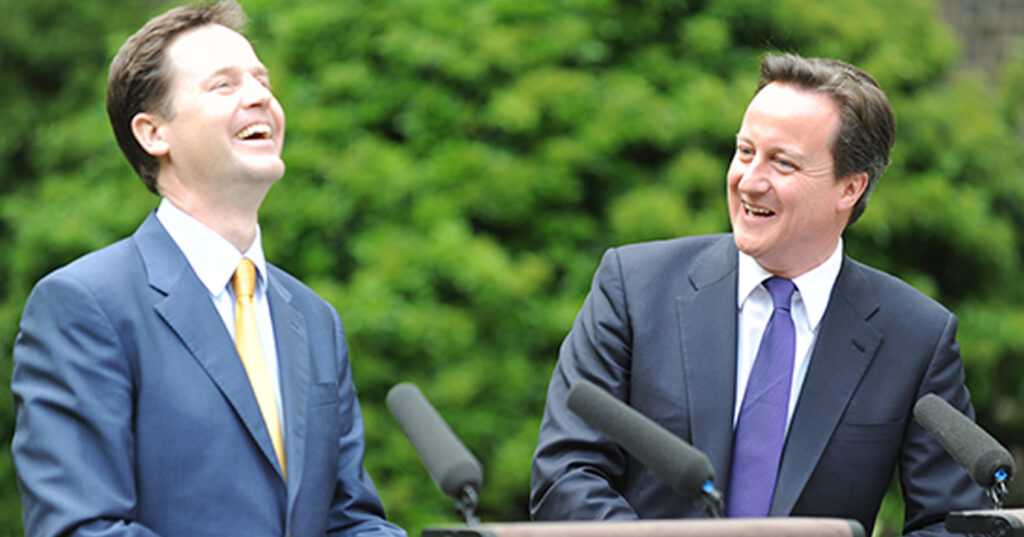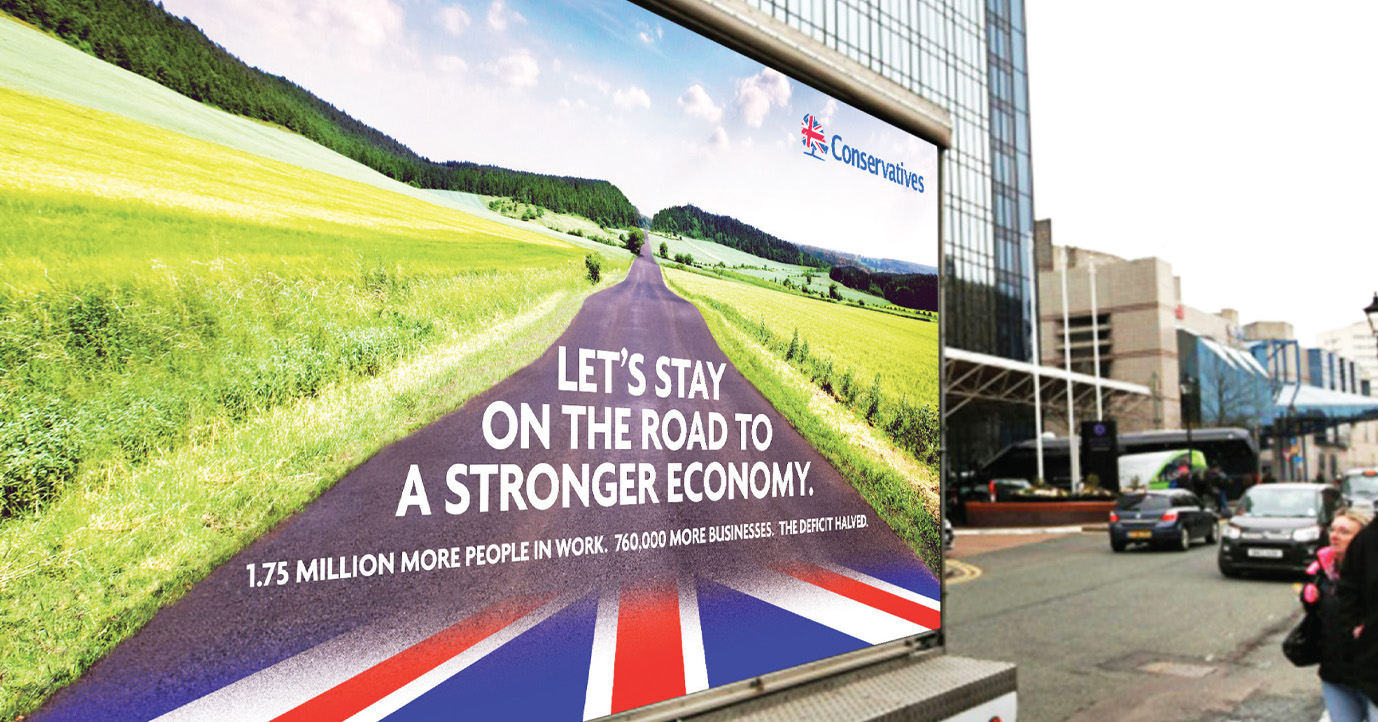
This essay appears in The Politicos Guide To The 2015 General Election
Let’s start with a quiz. Shortly after the last election, which clown wrote this?
“Even if the stars had aligned in such a way as to make a minority Conservative government a real possibility, the choice David Cameron made to enter a coalition would still have been the right one, both for the country and for the Conservative Party.”
All right, I confess. Enough of you will have read Minority Verdict all the way to the end to know that it was me. The contention that forming a coalition was the right thing for the country surely still stands: Britain faced a debt crisis and needed a strong, stable government to restore confidence and put the finances in order. But the right decision for the Conservative Party? With the benefit of hindsight, does that still bear scrutiny?
For many Tories, coalition has been an unhappy experience that they hope never to have to repeat. It has meant compromise and frustration, which some voters share. But if the Conservative Party has been unable to show more voters why it deserves their support, it can hardly point to coalition as the culprit.
After failing to win outright in 2010, the party’s political task in this parliament should have been clear. It had to prove to people who had never voted Conservative before what, at best, they had only been able to take on trust: that the party really was on their side, and would look after their public services as well as run the economy and more traditionally Tory issues like immigration. Tories needed to show they could be trusted to govern on their own.
Four years have gone by and there have been some successes. Though most people are yet to feel any personal benefit from the recovery, the Conservatives have established a clear and consistent lead over the other parties when it comes to running the economy. They are more likely than Labour to be thought willing to take tough decisions for the long term, and David Cameron is seen as by far the best available Prime Minister. These are not small things, and in most previous parliaments would have been enough to secure re-election.
Yet despite these twin advantages the party has remained stubbornly behind for most of the parliament. What are the barriers to Tory progress? My national polling has found the Conservatives are now even less likely than they were in 2010 to be seen to represent the country as a whole, to be on the side of ordinary people, to have its heart in the right place, to stand for fairness, and to be trusted with the NHS. While people think a Conservative government after 2015 is more likely than a Labour one to bring about economic growth and effective welfare reform, they also think it more likely to mean “higher taxes for people like me”. During the last parliament the party’s research would consistently find undecided voters thinking the Tories were best represented by a picture of a posh family standing outside an enormous house. When I repeated the exercise recently, the result was the same.
A certain kind of Tory finds it exasperating to be reminded of this sort of thing. It sounds to them like a lot of touchy-feely nonsense that Conservatives should have no truck with. The trouble is, these perceptions costs the party votes and seats. As Mitt Romney found to his cost, competence is not enough to win if too many think that competence will be deployed in the interests of people other than themselves.
In the same way, the “modernisation” of the Conservative Party, which many Tories hope they have heard the last of, is not complete, or something that can ever be completed. A modern party is one that is in touch with the times and understands the lives, aspirations and anxieties of the people it hopes to represent.
That has been true of the Conservatives in the past, and David Cameron has made some progress on that front during his nine years in charge. But there remains a gulf. It is one that applies to all parties in differing degrees, but to the Conservatives most of all. To take one example, the party likes to talk about “the strivers”: people of modest means who work hard, try to improve their lot through their own efforts and share what Tories like to think of as Conservative values. But as I found in my Blue Collar Tories research, such people do not see the Conservative Party as their natural ally, as they once did. Rather than helping those wanting to get on, the Tories now seemed to be for those who had already made it. By no means did these voters begrudge the rich their success, but in their own lives anxiety and insecurity were as much a force as ambition. Would the party of aspiration be there for them if their fortunes dipped?
As well as re-enlisting people who had once been its natural supporters, to have any hope of a majority the Conservatives needed to reach people who had never even thought of voting Tory. In particular the party needed to win greater support among ethnic minority voters. In Degrees of Separation I found that only 4 per cent of black voters identified with the Conservatives, while 55 per cent identified with Labour. Asian voters were nearly twice as likely to say Labour understood minorities than to say the same of the Conservatives; black voters were nearly three times as likely. If this was once just a regrettable fact for the Tories it is fast becoming an urgent problem with electoral consequences: the non-white population of the target seats the Conservatives failed to win in 2010 was well above the national average, especially in London.
The picture is not uniformly bleak for the party: in my research younger Hindus and Sikhs working in the private sector, for example, were comparatively open to the idea of one day switching to the Tories. But are these voters – or people in northern marginals who wanted a change in 2010 but felt Labour’s caricature of the Tories was a bit too close to the truth, or aspirational but insecure working class voters, or those who work in the public sector, or many others who have been put off because they doubted the Tories’ priorities – any closer to feeling that the Conservative Party is on their side than they were in May 2010?
I fear they are not. But to go back to my initial question, how much of that is down to the fact of being in coalition? Or to put it another way, would a minority Tory administration have done more to show it was on the side of ordinary people, or win confidence on the NHS, or convince voters from ethnic minorities, or avoid rows about Europe, or even – given the parliamentary maths – been able to do more on immigration or human rights reform?
Ultimately, the question the Tories were unable to answer properly before 2010 – and still are – is this: what is the purpose of a Conservative government? Too many people think the party exists to benefit the few; in government it has had the chance to show it is for those who want to get on, or just get by. The need for austerity and genuinely tough choices have made it a harder test to pass – but for the Tories to blame being in coalition would be a cop-out.
For the Liberal Democrats, the unfamiliar experience of office has posed a different test. Junior coalition partners often struggle to maintain a distinct identity; this has been doubly hard for the Lib Dems because their identity was somewhat hazy to start with. For years they had campaigned as either not-Labour or not-the-Tories, as local circumstances required, and they were the most obvious choice for those who wanted none-of-the-above. The ambiguities of equidistance inevitably meant that when they joined a coalition, as they had always wanted, a large chunk of their supporters would react not with rejoicing but with fury: by the end of 2010, the party’s poll rating was less than half their general election vote share. Entering office, then, did not so much cause the Lib Dems’ weakness as expose it.
That is not to say that joining the coalition was the wrong decision. One of the biggest barriers to supporting the Lib Dems had always been the idea that they were a wasted vote; being offered a share of power and rejecting it would surely prove the case. Indeed what would be the point of a political party that had a chance of governing but turned it down?
Nick Clegg grasped all this, and some of the realities of government, with impressive stoicism: when he was compelled to break his pledge to oppose any rise in tuition fees, he apologised not for the government’s policy but for having made such a daft promise in the first place. And on the need for austerity and deficit reduction the Lib Dems have been surprisingly staunch.
These things have not made their electoral position any easier. From the outset, the political temptation for the party would be to try and have things both ways: to be both a responsible party of government capable of dealing with reality, and a party of opposition-in-office, always ready to disown the necessary but unpopular.
But as I concluded in my research papers What Future For The Liberal Democrats? and What Are The Liberal Democrats For?, taking an oppositionist approach, trying to burnish their leftist credentials or even leaving the coalition early in an attempt to win back left-wing former supporters is unlikely to succeed. For these people, how the Lib Dems perform in government is beside the point: they blame the party for putting the Conservatives in office and that cannot be pardoned. Many of them would not give the Lib Dems a second look unless they promised never to work with the Tories again – something they can hardly do. For those who are determined to vote for none of the above, the Lib Dems have ruled themselves out indefinitely by becoming very much one of the above.
Nick Clegg’s true audience, then, comprises those who want his party to make a constructive contribution to government. That means the Lib Dems’ test in this parliament was to play the hand they were dealt as best they could; to use what clout they had to the best possible effect.
It would be hard to argue that they have passed this test. Few think Clegg or his party have exerted any real influence; though many people (including many Conservative voters) are glad they are there to temper Tory excesses, they struggle to name any concrete Lib Dem achievements.
This is hardly surprising. True, the Lib Dems have had only a limited degree of leverage, but what have they used it to achieve? The pupil premium, for which they like to claim credit, was also in the Conservative manifesto, and there was probably little disagreement between the parties on raising the income tax threshold.
Three things incontrovertibly happened because the Liberal Democrats were in government and would not have happened otherwise: a pointless referendum on the voting system, proposals for an elected House of Lords that went nowhere, and free school meals for primary school children who do not need them. I would like to see all that on their leaflets.
In this parliament the Lib Dems have certainly been in an unenviable position. Perhaps it might have been eased had they chosen to use their share of power to pursue something other than their own obsessions.
Labour’s test since 2010 has been to show they have learned the lessons of the last government and that they can be trusted to run the economy. They have not so much failed this test as refused to hand in their homework. The party’s response to austerity, which voters largely thought necessary if disagreeable, was to oppose every cut, implying that they would borrow still more – while complaining that the deficit was not falling fast enough. Hardly surprising, then, that the Tories have maintained a clear and consistent lead on economic management, and that the biggest specific concern potential Labour voters have about returning the party to office is that they would once again spend and borrow more than the country can afford.
If the image that defined the Conservative Party in the years before 2010 was a rich family, for Labour it was a fat slob lying on a sofa. He largely symbolised Labour’s perceived tendency to indulge those who chose not to work. For all their backroom wonkery on strengthening the contributory principle, the impression the Labour Party has managed to convey on welfare reform – one of the few elements of the government’s programme people spontaneously praise – is that they are against it. Not surprisingly, the slob remains Labour’s mascot five years later.
Labour’s brand was not as badly broken in 2010 as the Tories’ was in 1997. People are much more likely to think Labour has its heart in the right place and essentially stands for fairness and helping ordinary people. But many who are tempted to vote Labour in 2015 have real reservations about the party returning to office.
One of these reservations is Ed Miliband. My polling has consistently found less than a third of voters, including those in marginal seats Labour need to win, saying they are dissatisfied with David Cameron’s performance and would rather see Miliband in Downing Street. Indeed only two thirds of Labour voters themselves say this. Most swing voters’ reaction is that he is uninspiring, and even four years into his leadership say his brother would have been the better choice.
But doubts about Labour’s ability to keep the books in order is just as big a misgiving. My polling has found that while people think a Labour government is more likely than a Tory one to mean more house building, action on the cost of living and improvements in the NHS, it is also more likely to bring more borrowing and debt.
If membership of a coalition government does not excuse the Conservatives and Liberal Democrats their own failures, it is at least a mitigating circumstance. Labour have no such defence. So why have they not confronted people’s doubts? After all, Tony Blair would never have risked losing because people thought Labour were on the side of the feckless or were not to be trusted with the public finances; he went out of his way to reassure people every day, even when he was twenty points ahead. Why won’t Ed Miliband’s Labour do the same? I think there are two reasons: they don’t want to, and they don’t think they need to.
As I found soon after the election in What Future For Labour?, voters who switched away from the party in 2010 thought it had lost because Gordon Brown was not a good Prime Minister, that Labour did not have answers on the most important issues, and that the government had run out of steam. Labour loyalists, meanwhile, thought they had lost because people failed to appreciate what Labour had achieved, credulous voters had been influenced by the right-wing media, and though Labour’s policies were right they had been communicated badly. Most thought Labour had not deserved to lose and that the party should defend its record in government – that is, tell the electorate why it had made a mistake – rather than change, let alone apologise.
Most members of the Labour movement also thought the coalition would prove so unpopular that their party would win the next election almost by default. In the first instalment of my Project Blueprint research in 2011 I noted that the combination of Labour’s core supporters with Lib Dem defectors meant that Ed Miliband could in theory assemble a winning vote share without needing to get out of bed. It is one thing to make this point as an observer, but quite another to use it as an operating assumption. Still, that is what he seems to have done – and that is why we still await his breakthrough.
None of the established parties, then, can truly claim to have met the challenges the voters set them. The Conservatives have not properly shown their purpose to people who do not trust their motives; the Lib Dems have used what power they have to fruitless ends; Labour have complacently declined to tackle the fears people have about putting them back in charge.
All this has created an opportunity for UKIP, which they have taken with some aplomb. The polling for my 2012 study They Thinking What We’re Thinking: Understanding The UKIP Temptation found the party’s support was based more on outlook than policy. Immigration and the European Union are powerful factors in driving people to UKIP, but so is a wider dissatisfaction with the way they see things going in Britain.
Nigel Farage has converted this disillusionment not just into a significant poll share but into real votes in local elections, by-elections and, most spectacularly, European Parliament elections. Last May my polling found that six in ten of those who had voted UKIP in the European elections had done so in order to show they were unhappy with their usual party, or as a general protest.
But general elections are different. One of the most important dynamics affecting the result next May will be the extent to which UKIP can maintain momentum and turn disaffection into votes when people have the chance to choose a government, not just send a signal. My polling has found that more than half of all voters think UKIP “are prepared to say things other parties are scared to say”, but they are much less likely to think the party “reasonable and sensible” – which, despite everything, are qualities people still want in those who govern. Yet my post Euro-election research found that half of UKIP voters – or only half, depending on your point of view – said they would probably vote for the party again in 2015.
In order to maximise their impact UKIP are likely to target their resources on perhaps twenty five seats where the demographics and political circumstances work most in their favour.
And because of the national stalemate, the marginals will matter more than ever. My polling in the battleground constituencies will continue up to the end of the campaign, but it has already given us some clues. Labour seem to have the edge over the Conservatives in the most marginal seats they will be contesting directly. The Lib Dems still command a loyal local vote, but only in a few places will this be enough to withstand the national tide against them. UKIP are inflicting damage on all parties, especially the Tories, and have the potential to break through in a handful.
But while there are patterns, swings in constituencies I have polled are very far from uniform; there are big variations between constituencies with similar majorities. In an election whose result will be counted in individual seats, these are the places that will decide the next incumbent of Downing Street.
As for the national battle, will the Tory lead on the economy start to tell in their vote share? Will more good economic news buoy the government, or take the urgency away from economic questions and allow the focus to move to issues like public services, where Labour have the advantage? How will people who prefer Cameron to Miliband but Labour to the Tories resolve their dilemma?
And if, as the signs are, this is the closest election in forty years, will it be because the country is divided between competing visions of Britain – or because it thinks the winner is neither here nor there?
The Politicos Guide To The 2015 General Election includes analysis of key marginal seats, demographics, examples of historical precedent, lists of candidates, regional and constituency data, as well as analysis from high-profile commentators


